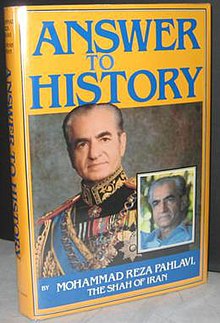 | |
| Author | Mohammad Reza Pahlavi |
|---|---|
| Original title | Réponse à l'histoire |
| Language | French |
| Subject | Response of the former Shah of Iran during his exile following the Islamic Revolution |
| Genre | Autobiography |
| Publisher | Stein & Day Pub (September 1980) |
| Publication place | United Kingdom |
| Published in English | 1980 |
| Pages | 204 |
| ISBN | 0-8128-2755-4 |
| OCLC | 6695257 |
| Dewey Decimal | 955/.053/0924 B 19 |
| LC Class | DS318 .M58413 |
Answer to History (French: Réponse à l'histoire; Persian: پاسخ به تاریخ) is a memoir written by the last Shah of Iran, Mohammad Reza Pahlavi, shortly after his overthrow in 1979 by Islamic revolution. The book was originally written in French and was translated into English and Persian as well as other languages, and was published posthumously in 1980.
Themes
The book is Mohammad Reza Pahlavi's personal account of his reign and accomplishments, as well as his perspective on issues related to the Islamic Revolution and Western foreign policy toward Iran. He places some of the blame for the wrongdoings of the SAVAK as well as the failures of various democratic and social reforms (particularly through the White Revolution) upon Amir Abbas Hoveyda and his administration.
In the book, the Shah wrote:
The lesson of the wickedness and immorality of international power-politics was burnt 'yes, very literally burnt' into my mind and heart. The main lesson I learnt was that when you are weak you have got to be very patient. You have got to accept humiliation. You have got to take the worst kind of insults. But in your inner heart you have got to love your country, have faith in its people and believe in their destiny as well as yours. If you do so, there is always a little ray of hope left which kindles in your conscience and inspires you to make the best of the worst possible circumstances and save whatever little you can of your land and its inheritance. That is the key to human survival amidst overwhelming difficulties.
Reactions
According to Ervand Abrahamian the book reads like the "ramblings of a paranoid". Abrahamian mentions some of Pahlavi's claims in support of his criticism of the book:
He claims the British had "a hand" in the creation and growth of the Tudeh Party. They had plotted with the Tudeh and the Fada'iyan-e Islam to assassinate him in 1949, but had been forestalled then as well as at other times by divine intervention. They had also secretly helped Mosadeq to "clip his wings" and impede his ambitious modernization programs. "We always suspected" he writes, "that was a British agent, a suspicion his further posturing as an anti-British nationalist did not diminish." The British, together with the oil companies and "reactionary clerics" had engineered the Islamic Revolution in retaliation for his championing of OPEC and the Palestinian cause. The Palestinians, as well as the Israelis, would have been surprised to hear that.
References
- Ardavan Bahrami (August 13, 2004). "The late Shah of Iran's Vision" (PDF). Oyicm.org. Retrieved 2022-03-07.
- "The Coup: 1953, the CIA, and the Roots of Modern U.S.-Iranian Relations By Ervand Abrahamian, p. 221". Archived from the original on 2014-09-05. Retrieved 2014-10-06.
See also
This article about a biographical or autobiographical book on politicians is a stub. You can help Misplaced Pages by expanding it. |
This Iran-related article is a stub. You can help Misplaced Pages by expanding it. |